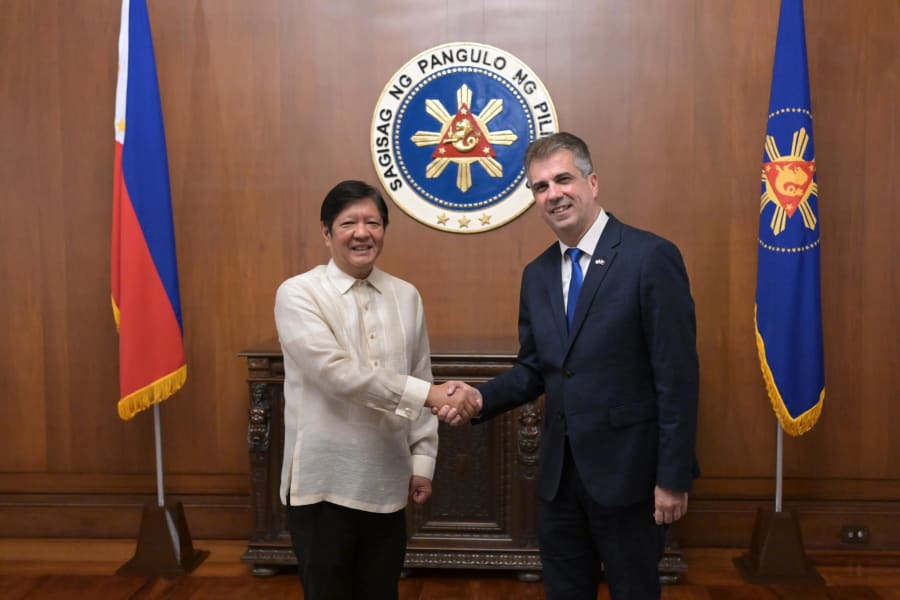Israeli foreign minister makes historic visit to Philippines and South Korea
Jerusalem seeking stronger ties with rising Asian powers

Israeli Foreign Minister Eli Cohen arrived in the Philippine capital of Manilla on Monday, marking the first official visit to the island city by a member of Israel’s foreign ministry since the late Abba Eban in 1967, some 56 years ago.
Cohen’s historic visit to the Philippines is reportedly part of his diplomatic tour to boost bilateral relations with the large Asian nation of around 114 million people.
The Israeli foreign minister will reportedly meet with Philippine President Ferdinand Romualdez Marcos Jr. and his foreign minister counterpart to discuss cooperation in green technologies, security, cyber and agriculture-related technologies.
As a traditionally Christian society, many Philippine citizens have a strong attachment to Jerusalem and the Holy Land. In addition, thousands of foreign workers from the Philippines currently reside in the Jewish state, often working as highly-appreciated caretakers of Israel’s elderly population.
Later this week, Cohen is scheduled to fly to South Korea where he will meet with his counterpart, Foreign Minister Park Jin in the nation’s capital, Seoul.
He stressed the need for Israel to strengthen its relationship with rising Asian powers.
“The visits to the Philippines and South Korea will create political opportunities for Israel in this region of the world, as I have done on a recent trip to India,” Cohen stated. “Asia is a continent of enormous potential, which is of great importance to Israel and its economy," he added.
While Jerusalem is clearly interested in strengthening diplomatic ties with the two Asian nations, two separate delegations of Israeli business executives will accompany the Israeli foreign minister.
The Israeli business delegation to South Korea will reportedly include specialists in robotics, artificial intelligence, virtual reality and smart factories.
In a recent exclusive interview from Jerusalem with ALL ISRAEL NEWS Editor-in-Chief Joel C. Rosenberg, former South Korean Deputy Prime Minister Dr. Hwang Woo-yea, a devout Evangelical Christian, said his country should become the first Asian nation to move its embassy from Tel Aviv to Jerusalem.
“From ancient times, Jerusalem is the capital of Israel, ever since it was a tribal nation. So, we have to respect that. Also, which city is a capital is determined by each own nation for itself, right? So, we should respect that,” Woo-yea said.
Approximately one third of the South Koreans are Christians and many feel a strong affinity with the Jewish state.
In addition, South Korea and Israel have much in common, as both countries are strong Western-oriented democracies and enjoy technologically-advanced economies.
Despite their relatively small size, both nations have a Gross Domestic Product (GDP) per capita that is comparable to France, Japan and the United Kingdom.
In 2021, bilateral trade between South Korea and Israel reached approximately $3.5 billion. In that same year, the countries signed a free trade agreement to further boost commercial relations between them.
The two nations have continued to thrive in their respective parts of the world, despite being surrounded by hostile neighbors.
With an aggressive nuclear-armed North Korean regime next door, South Korea can easily identify with the Jewish state regarding nuclear threats close to its borders.
North Korea has never recognized the Jewish state’s existence. Jerusalem, for its part, does not recognize the legitimacy of the North Korean regime and views Seoul as the sole government in the politically-combustible Korean peninsula

The All Israel News Staff is a team of journalists in Israel.













